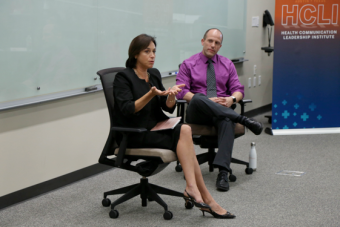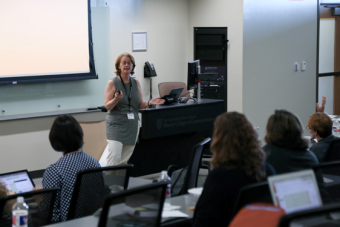HCLI 2018: Reflections
By Mike Mackert
This past week was the Center for Health Communication’s Health Communication Leadership Institute (HCLI). It was the fourth time we’ve hosted this event, which is a mix of training in health communication best practices and leadership development.
In its fourth iteration, I feel like HCLI has truly hit its stride. We had great sponsors this year (Pfizer, HCA Gulf Coast Division, MD Anderson Cancer Center, and the Truth Initiative) and participants from a diverse set of backgrounds. This HCLI probably had a broader range of participants and speakers than any previous year, and that’s one reason I would argue this was our best HCLI so far.
I won’t even pretend to pick a favorite speaker or moment. I’ll just hit highlights:
- Shana Merlin and Rob Milman, who work with the CHC on improv-based medical education, got the first day of HCLI off to a lively start with a focus on growth mindset (and fun!).
- Brenda Berkelaar led an extended session using 360 evals for each participant to identify their strengths as leaders and areas for growth and improvement.
- Jay Bernhardt (founding director of the CHC and Dean of the Moody College of Communication) offered both the history of the field of health communication and thoughts on where the field is going and what it will mean to be a health communication leader.
- Charlee Garden (LBJ School of Public Affairs) focused on creating culture as a leader. How do you lead people when you aren’t in the room? So many people remembered one of her key points: culture eats strategy for breakfast.
- A panel of communication professionals – Leslie Wingo (Sanders\Wingo), Sean Burnett (HCA Gulf Coast Division), Baker Harrell (IT’S TIME TEXAS), and Matt McCutchin (Stan Richards School of Advertising & Public Relations) – were each challenged to share three key things that every HCLI participant should know from their work. (Baker cheated and included four.) The wisdom they shared was brought back up throughout the remainder of the conference.
- A panel of health communication faculty – Dawna Ballard (Department of Communication Studies), Matt McGlone (Department of Communication Studies), and Kate Pounders (Stan Richards School of Advertising & Public Relations) – shared their research on issues ranging from time in organizations to message framing to emotion and identity in health promotion. It was fun seeing faculty translate their research to make it practically useful for professionals.
- Donna Vallone (Chief Research Officer at the Truth Initiative) shared the story of the Truth Initiative and its anti-tobacco health communication work. It was a riveting story and engaging Q&A.
- Participants tackled a case study in conjunction with MD Anderson Cancer Center about how a joint statement from National Cancer Institute-funded cancer centers around HPV vaccination could actually promote vaccination.
- Karen DeSalvo (Dell Medical School) shared how she came to be passionate about the social determinants of health and the role better communication has in advancing public health.
Whew.
In the closing session, each participant was asked to share one thing they would take with them from the event back to their organization. I was heartened by the number of participants who spoke of the simple inspiration they received by being with their tribe, and the refreshed passion they would be able to bring back to their work. I’m glad this event can offer that to participants, and it makes me hopeful for the future of the field – we’re helping develop great health communication leaders every year at HCLI.

Dr. Karen DeSalvo and Dr. Michael Mackert discussing healthcare & the role of improved communication



